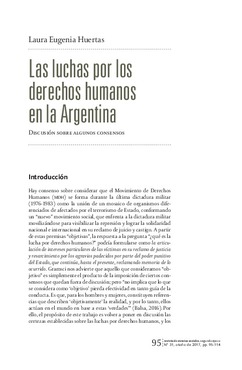Las luchas por los derechos humanos en la Argentina : discusión sobre algunos consensos

Ver/
Fecha
2017-04Autor
Huertas, Laura EugeniaResumen
El estudio del proceso histórico reciente y el protagonismo, masividad y persistencia que adquirió la lucha por los derechos humanos en la Argentina nos han conducido hacia una crítica del paradigma teórico dominante desde el que se aborda el tema en particular y el conflicto social en general, buscando explicar la significación profunda que adquieren estas luchas, aun en el presente, y los efectos de sus conquistas y derrotas en toda la sociedad.
La aplicación de instrumentos teórico-metodológicos aportados por el marxismo nos orienta a una revisión crítica de las caracterizaciones establecidas de estas luchas y del relato histórico. Consideramos que la finalidad del análisis histórico y sociológico no es recuperar la memoria del pasado, sino investigar los hechos para poder explicarlos, y que el análisis de las luchas por derechos humanos en la Argentina es una oportunidad excepcional para abordar desde él cuestiones fundamentales, exponiendo las consecuencias que las distintas posiciones teóricas tienen en la (in)
comprensión de los antagonismos que articulan el conflicto en la sociedad dividida en clases, y de los recursos estratégicos puestos en juego en los hechos de resistencia subalterna y por la clase dominante para lograr dirigir los procesos de cambio social.
El objetivo de este trabajo es, a partir de las preguntas que nos orientan, identificar los ejes principales de problemas teóricos involucrados y poner en discusión los instrumentos teórico-metodológicos aplicados por las corrientes de pensamiento hegemónico como base de una crítica que entendemos necesaria e impostergable. The study of the recent historic process and the preponderance, popularity and persistence which the struggle for Human Rights in Argentina acquired, has led us towards a criticism of the dominant theoretical paradigm which addresses the issue in particular, and the social conflict in general. We seek to explain the deep meaning acquired by these struggles, still in the present, and the effects of their conquests and defeats in all of our society.
The application of theoretical-methodological instruments provided by Marxism guide us to a critical review of the established characterizations of these struggles and of the historical narration. We consider that the aim of the historical and sociological analysis is not to recover the memory of the past, but to investigate the facts in order to explain them. The analysis of the struggles for Human Rights in Argentina is an exceptional opportunity to address fundamental issues, revealing the consequences that the different theoretical standings have regarding the (in)comprehension of the antagonisms that articulate the conflict in our class divided society, and of the strategic resources at stake in the actions of subaltern resistance and the dominant class in order to steer the processes of social change. The objective of this article is, based on the questions that guide us, to identify the main axis of the theoretical problems that are involved and discuss the theoretic-methodological instruments applied by the hegemonic schools of thought as a basis for a critique which we believe to be necessary and unpostponable.
